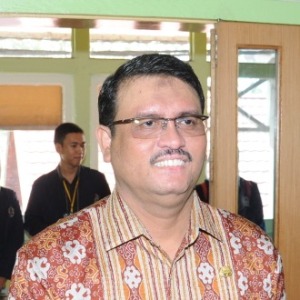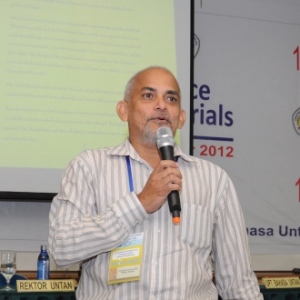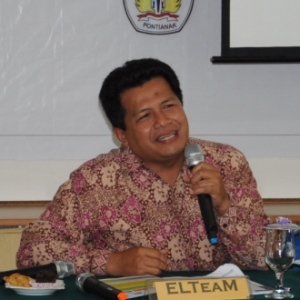The First International Conference on Language Teaching Materials was held by Tanjungpura University Language Center in cooperation with ELTeaM. The conference was also fully supported by the Rector of the university, Prof. Dr. Thamrin Usman, who opened the conference officially by giving a motivating keynote speech. The conference was held in two days, 17-18 December 2012. One day pre-conference workshop was held on 16 December 2012. All activities were conducted at Tanjungpura University Campus.
.
Dr. Regina, the Head of the language center, the Chair of the Steering Committee, gave full support, including finance and human resources. In the opening session she warmly welcomed all the participants and the speakers and invited them to visit the Language Center of the University. She also kindly toured the plenary speakers and some participants to Kapuas River and some other sites in Pontianak. In the closing speech she invited the speakers as well as the participants to come again to Pontianak, especially to Tanjungpura University..
Six Plenary Speakers in 1st Conference (2012)
Dr. Ivor Timmis. Language Research and Language Teaching Materials: Bridging the Gap. This talk discusses the notion of authentic materials in the contemporary ELT context. The extent to which materials should be authentic has long been debated in ELT, but, I will argue, an extra dimension has been added to the debate by two competing developments: (1) corpus linguistics has given us a fuller picture of what native speaker English is actually like; and (2) the growing international use of English has led many to question the relevance of native speaker models of English in ELT. In this talk, I will present a representative sample of the grammatical and lexical insights from corpus linguistics which are of potential relevance to materials developers. I will then review the arguments for and against taking such insights into account when we are designing materials. Finally, I will suggest that we can have the best of both worlds: we can use more and less authentic versions of the same text, and we can allow corpora to inform our materials without dictating the content of our materials.
Dr. Jayakaran Mukundan. Success in collaborative work – from idea generation to publishing. Some things just cannot work during class time. While a lot of people in ELT champion the cause for project work, teachers sometimes disagree with the over-sell simply because many of these projects require time and cannot be implemented during regular class time. However project work can be more achievable if it is done as part curricular and part co-curricular activity. Most of the idea-generation phases can be done in class but the developmental stages can be carried outside class time. I recently started a video project based on themes set in the Malaysian secondary school syllabus. Students had to work on their 3 minute film over 3 weeks. Students worked on idea generation and storyboarding in class while the shooting and editorial aspects were done out of class. As soon as production ended, peer review and critique sessions started. The students then organized their own Awards Night. All their products have been published on You Tube. The success of collaborative work was apparent. Students also developed a lot of enthusiasm while working the project.
Prof. Kasihani ES, PhD. Research- Based Material Development: A Teacher Trainer is a Material Developer. The basic question of this paper is whether a teacher trainer has an ability to help teachers provide materials for their students? If she does, then, how does she develop the matrials? Having been working as a teacher and teacher trainer, the writer realized that the information obtained from research findings, teachers and students’ input, and field experience can be the best start to write/develop instructional materials. By following a kind of research and development procedure, she used relevant research findings to define the instructional objectives, to select and suquence the available sources, to adapt and develop materials for primary and secondary school students, and to profide refrences for teachers and teacher candidates as well. For sure, I beleave and agree with Tomlinson’s statement (2004) that teachers using their experience, confidence and competence are able to be material developers themselves. Under Indonesian situation, English instruction including materials need continous improvement.
Dr. Naeema Hann. Context and Effect of English for Employability Training Materials in the United Kingdom. The last decade has seen a continuing emphasis on English as a Second or Other Language (ESOL) provision being linked to employability and vocational skills (HC 2006). At least four of the recommendations in the UK Office for Standards in Education, Children’s Services and Skills report (Ofsted 2008) relate to ‘employability programmes’, ‘workplace learning’ and ‘vocational study’. This paper presents materials and teaching procedures for English for Employability and their effect on student progression and success on work based courses. The materials and procedures draw on the presenter’s experience and a research project which investigates student and tutor perceptions of what supports progress in language skills on a vocational programme.
Sudarsono,Phd. “I am Write a Letter”: How Come? Various ungrammatical constructions may be performed by Indonesian students that study English as a foreign language. This research investigated why university students constructed the ungrammatical expressions like “They are write a letter”. To answer this question, this study was conducted by collecting data in the form of corpus and interview from students and teachers/ lecturers of English. The research findings indicate that this type of ungrammatical construction was mainly initiated by the negative transfer of Indonesian non-verbal sentence into English. This was then developed by mechanical drill teaching technique applied by the teachers to overcome the negative transfer from Indonesian into English. Unfortunately, this technique produced another type of problem, that is most students applied the auxiliary verb and the subject into a single unit before the simple present verb. Besides, the order of teaching materials also contributed this type of unacceptable construction. The teachers were found introducing the English constructions which are actually different from Indonesian. In addition to the curriculum and textbook argument, they surprisingly argued that teaching non-verbal sentences of English was easier than teaching the verbal ones to their students.
Ikhsanudin. Electronic School Book Program: Providing Quality Textbooks for Indonesian Learners. It is very important to provide affordable quality textbooks for learners nationwide. In a new democratic society as in Indonesia, such an effort needs comprehensive preparations including the provision/providers, the community’s participation, and the government organization. This paper explores how those attempts have been done in Indonesia, that is how national reform influenced book reform, namely through Electronic School Book Program. It covers the rationale, legal basis, and implementation. It also explains why the Book Center of the Ministry of National Education has changed its role, from book provider to book regulator and book information center. The last part exposes the problems that have aroused the in the most recent national text book situation and how the government did its best to solve the problems.








